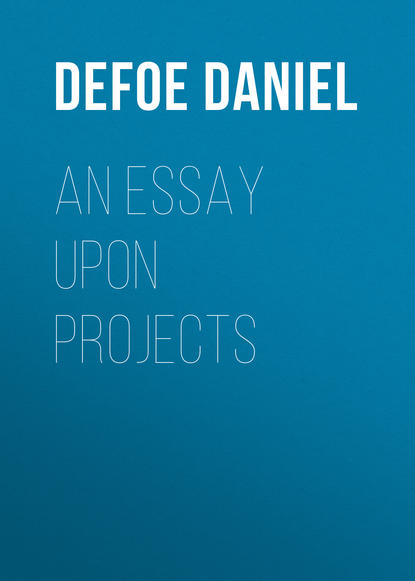 Полная версия
Полная версияПолная версия:
Даниэль Дефо An Essay Upon Projects
- + Увеличить шрифт
- - Уменьшить шрифт

Daniel Defoe
An Essay Upon Projects
INTRODUCTION
Defoe’s “Essay on Projects” was the first volume he published, and no great writer ever published a first book more characteristic in expression of his tone of thought. It is practical in the highest degree, while running over with fresh speculation that seeks everywhere the well-being of society by growth of material and moral power. There is a wonderful fertility of mind, and almost whimsical precision of detail, with good sense and good humour to form the groundwork of a happy English style. Defoe in this book ran again and again into sound suggestions that first came to be realised long after he was dead. Upon one subject, indeed, the education of women, we have only just now caught him up. Defoe wrote the book in 1692 or 1693, when his age was a year or two over thirty, and he published it in 1697.
Defoe was the son of James Foe, of St. Giles’s, Cripplegate, whose family had owned grazing land in the country, and who himself throve as a meat salesman in London. James Foe went to Cripplegate Church, where the minister was Dr. Annesley. But in 1662, a year after the birth of Daniel Foe, Dr. Annesley was one of the three thousand clergymen who were driven out of their benefices by the Act of Uniformity. James Foe was then one of the congregation that followed him into exile, and looked up to him as spiritual guide when he was able to open a meeting-house in Little St. Helen’s. Thus Daniel Foe, not yet De Foe, was trained under the influence of Dr. Annesley, and by his advice sent to the Academy at Newington Green, where Charles Morton, a good Oxford scholar, trained young men for the pulpits of the Nonconformists. In later days, when driven to America by the persecution of opinion, Morton became Vice-President of Harvard College. Charles Morton sought to include in his teaching at Newington Green a training in such knowledge of current history as would show his boys the origin and meaning of the controversies of the day in which, as men, they might hereafter take their part. He took pains, also, to train them in the use of English. “We were not,” Defoe said afterwards, “destitute of language, but we were made masters of English; and more of us excelled in that particular than of any school at that time.”
Daniel Foe did not pass on into the ministry for which he had been trained. He said afterwards, in his “Review,” “It was my disaster first to be set apart for, and then to be set apart from, the honour of that sacred employ.” At the age of about nineteen he went into business as a hose factor in Freeman’s Court, Cornhill. He may have bought succession to a business, or sought to make one in a way of life that required no capital. He acted simply as broker between the manufacturer and the retailer. He remained at the business in Freeman’s Court for seven years, subject to political distractions. In 1683, still in the reign of Charles the Second, Daniel Foe, aged twenty-two, published a pamphlet called “Presbytery Roughdrawn.” Charles died on the 6th of February, 1685. On the 14th of the next June the Duke of Monmouth landed at Lyme with eighty-three followers, hoping that Englishmen enough would flock about his standard to overthrow the Government of James the Second, for whose exclusion, as a Roman Catholic, from the succession to the throne there had been so long a struggle in his brother’s reign. Daniel Foe took leave of absence from his business in Freeman’s Court, joined Monmouth, and shared the defeat at Sedgmoor on the 6th of July. Judge Jeffreys then made progress through the West, and Daniel Foe escaped from his clutches. On the 15th of July Monmouth was executed. Daniel Foe found it convenient at that time to pay personal attention to some business affairs in Spain. His name suggests an English reading of a Spanish name, Foà, and more than once in his life there are indications of friends in Spain about whom we know nothing. Daniel Foe went to Spain in the time of danger to his life, for taking part in the rebellion of the Duke of Monmouth, and when he came back he wrote himself De Foe. He may have heard pedigree discussed among his Spanish friends; he may have wished to avoid drawing attention to a name entered under the letter F in a list of rebels. He may have played on the distinction between himself and his father, still living, that one was Mr. Foe, the other Mr. D. Foe. He may have meant to write much, and wishing to be a friend to his country, meant also to deprive punsters of the opportunity of calling him a Foe. Whatever his chief reason for the change, we may be sure that it was practical.
In April, 1687, James the Second issued a Declaration for Liberty of Conscience in England, by which he suspended penal laws against all Roman Catholics and Nonconformists, and dispensed with oaths and tests established by the law. This was a stretch of the king’s prerogative that produced results immediately welcome to the Nonconformists, who sent up addresses of thanks. Defoe saw clearly that a king who is thanked for overruling an unwelcome law has the whole point conceded to him of right to overrule the law. In that sense he wrote, “A Letter containing some Reflections on His Majesty’s Declaration for Liberty of Conscience,” to warn the Nonconformists of the great mistake into which some were falling. “Was ever anything,” he asked afterwards, “more absurd than this conduct of King James and his party, in wheedling the Dissenters; giving them liberty of conscience by his own arbitrary dispensing authority, and his expecting they should be content with their religious liberty at the price of the Constitution?” In the letter itself he pointed out that “the king’s suspending of laws strikes at the root of this whole Government, and subverts it quite. The Lords and Commons have such a share in it, that no law can be either made, repealed, or, which is all one, suspended, but by their consent.”
In January, 1688, Defoe having inherited the freedom of the City of London, took it up, and signed his name in the Chamberlain’s book, on the 26th of that month, without the “de,” “Daniel Foe.” On the 5th of November, 1688, there was another landing, that of William of Orange, in Torbay, which threatened the government of James the Second. Defoe again rode out, met the army of William at Henley-on-Thames, and joined its second line as a volunteer. He was present when it was resolved, on the 13th of February, 1689, that the flight of James had been an abdication; and he was one of the mounted citizens who formed a guard of honour when William and Mary paid their first visit to Guildhall.
Defoe was at this time twenty-eight years old, married, and living in a house at Tooting, where he had also been active in foundation of a chapel. From hose factor he had become merchant adventurer in trade with Spain, and is said by one writer of his time to have been a “civet-cat merchant.” Failing then in some venture in 1692, he became bankrupt, and had one vindictive creditor who, according to the law of those days, had power to shut him in prison, and destroy all power of recovering his loss and putting himself straight with the world. Until his other creditors had conquered that one enemy, and could give him freedom to earn money again and pay his debts – when that time came he proved his sense of honesty to much larger than the letter of the law – Defoe left London for Bristol, and there kept out of the way of arrest. He was visible only on Sunday, and known, therefore, as “the Sunday Gentleman.” His lodging was at the Red Lion Inn, in Castle Street. The house, no longer an inn, still stands, as numbers 80 and 81 in that street. There Defoe wrote this “Essay on Projects.” He was there until 1694, when he received offers that would have settled him prosperously in business at Cadiz, but he held by his country. The cheek on free action was removed, and the Government received with favour a project of his, which is not included in the Essay, “for raising money to supply the occasions of the war then newly begun.” He had also a project for the raising of money to supply his own occasions by the establishment of pantile works, which proved successful. Defoe could not be idle. In a desert island he would, like his Robinson Crusoe, have spent time, not in lamentation, but in steady work to get away.
H. M.AUTHOR’S PREFACE
To DALBY THOMAS, Esq.,One of the Commission’s for Managing His majesty’s Duties on Glass, &c.
Sir,
This preface comes directed to you, not as commissioner, &c., under whom I have the honour to serve his Majesty, nor as a friend, though I have great obligations of that sort also, but as the most proper judge of the subjects treated of, and more capable than the greatest part of mankind to distinguish and understand them.
Books are useful only to such whose genius are suitable to the subject of them; and to dedicate a book of projects to a person who had never concerned himself to think that way would be like music to one that has no ear.
And yet your having a capacity to judge of these things no way brings you under the despicable title of a projector, any more than knowing the practices and subtleties of wicked men makes a man guilty of their crimes.
The several chapters of this book are the results of particular thoughts occasioned by conversing with the public affairs during the present war with France. The losses and casualties which attend all trading nations in the world, when involved in so cruel a war as this, have reached us all, and I am none of the least sufferers; if this has put me, as well as others, on inventions and projects, so much the subject of this book, it is no more than a proof of the reason I give for the general projecting humour of the nation.
One unhappiness I lie under in the following book, viz.: That having kept the greatest part of it by me for near five years, several of the thoughts seem to be hit by other hands, and some by the public, which turns the tables upon me, as if I had borrowed from them.
As particularly that of the seamen, which you know well I had contrived long before the Act for registering seamen was proposed. And that of educating women, which I think myself bound to declare, was formed long before the book called “Advice to the Ladies” was made public; and yet I do not write this to magnify my own invention, but to acquit myself from grafting on other people’s thoughts. If I have trespassed upon any person in the world, it is upon yourself, from whom I had some of the notions about county banks, and factories for goods, in the chapter of banks; and yet I do not think that my proposal for the women or the seamen clashes at all, either with that book, or the public method of registering seamen.
I have been told since this was done that my proposal for a commission of inquiries into bankrupt estates is borrowed from the Dutch; if there is anything like it among the Dutch, it is more than ever I knew, or know yet; but if so, I hope it is no objection against our having the same here, especially if it be true that it would be so publicly beneficial as is expressed.
What is said of friendly societies, I think no man will dispute with me, since one has met with so much success already in the practice of it. I mean the Friendly Society for Widows, of which you have been pleased to be a governor.
Friendly societies are very extensive, and, as I have hinted, might be carried on to many particulars. I have omitted one which was mentioned in discourse with yourself, where a hundred tradesmen, all of several trades, agree together to buy whatever they want of one another, and nowhere else, prices and payments to be settled among themselves; whereby every man is sure to have ninety-nine customers, and can never want a trade; and I could have filled up the book with instances of like nature, but I never designed to fire the reader with particulars.
The proposal of the pension office you will soon see offered to the public as an attempt for the relief of the poor; which, if it meets with encouragement, will every way answer all the great things I have said of it.
I had wrote a great many sheets about the coin, about bringing in plate to the Mint, and about our standard; but so many great heads being upon it, with some of whom my opinion does not agree, I would not adventure to appear in print upon that subject.
Ways and means also I have laid by on the same score: only adhering to this one point, that be it by taxing the wares they sell, be it by taxing them in stock, be it by composition – which, by the way, I believe is the best – be it by what way soever the Parliament please, the retailers are the men who seem to call upon us to be taxed; if not by their own extraordinary good circumstances, though that might bear it, yet by the contrary in all other degrees of the kingdom.
Besides, the retailers are the only men who could pay it with least damage, because it is in their power to levy it again upon their customers in the prices of their goods, and is no more than paying a higher rent for their shops.
The retailers of manufactures, especially so far as relates to the inland trade, have never been taxed yet, and their wealth or number is not easily calculated. Trade and land has been handled roughly enough, and these are the men who now lie as a reserve to carry on the burden of the war.
These are the men who, were the land tax collected as it should be, ought to pay the king more than that whole Bill ever produced; and yet these are the men who, I think I may venture to say, do not pay a twentieth part in that Bill.
Should the king appoint a survey over the assessors, and indict all those who were found faulty, allowing a reward to any discoverer of an assessment made lower than the literal sense of the Act implies, what a register of frauds and connivances would be found out!
In a general tax, if any should be excused, it should be the poor, who are not able to pay, or at least are pinched in the necessary parts of life by paying. And yet here a poor labourer, who works for twelve pence or eighteen pence a day, does not drink a pot of beer but pays the king a tenth part for excise; and really pays more to the king’s taxes in a year than a country shopkeeper, who is alderman of the town, worth perhaps two or three thousand pounds, brews his own beer, pays no excise, and in the land-tax is rated it may be at £100, and pays £1 4s. per annum, but ought, if the Act were put in due execution, to pay £36 per annum to the king.
If I were to be asked how I would remedy this, I would answer, it should be by some method in which every man may be taxed in the due proportion to his estate, and the Act put in execution, according to the true intent and meaning of it, in order to which a commission of assessment should be granted to twelve men, such as his Majesty should be well satisfied of, who should go through the whole kingdom, three in a body, and should make a new assessment of personal estates, not to meddle with land.
To these assessors should all the old rates, parish books, poor rates, and highway rates, also be delivered; and upon due inquiry to be made into the manner of living, and reputed wealth of the people, the stock or personal estate of every man should be assessed, without connivance; and he who is reputed to be worth a thousand pounds should be taxed at a thousand pounds, and so on; and he who was an overgrown rich tradesman of twenty or thirty thousand pounds estate should be taxed so, and plain English and plain dealing be practised indifferently throughout the kingdom; tradesmen and landed men should have neighbours’ fare, as we call it, and a rich man should not be passed by when a poor man pays.
We read of the inhabitants of Constantinople, that they suffered their city to be lost for want of contributing in time for its defence, and pleaded poverty to their generous emperor when he went from house to house to persuade them; and yet when the Turks took it, the prodigious immense wealth they found in it, made them wonder at the sordid temper of the citizens.
England (with due exceptions to the Parliament, and the freedom wherewith they have given to the public charge) is much like Constantinople; we are involved in a dangerous, a chargeable, but withal a most just and necessary war, and the richest and moneyed men in the kingdom plead poverty; and the French, or King James, or the devil may come for them, if they can but conceal their estates from the public notice, and get the assessors to tax them at an under rate.
These are the men this commission would discover; and here they should find men taxed at £500 stock who are worth £20,000. Here they should find a certain rich man near Hackney rated to-day in the tax-book at £1,000 stock, and to-morrow offering £27,000 for an estate.
Here they should find Sir J – C – perhaps taxed to the king at £5,000 stock, perhaps not so much, whose cash no man can guess at; and multitudes of instances I could give by name without wrong to the gentlemen.
And, not to run on in particulars, I affirm that in the land-tax ten certain gentlemen in London put together did not pay for half so much personal estate, called stock, as the poorest of them is reputed really to possess.
I do not inquire at whose door this fraud must lie; it is none of my business.
I wish they would search into it whose power can punish it. But this, with submission, I presume to say: The king is thereby defrauded and horribly abused, the true intent and meaning of Acts of Parliament evaded, the nation involved in debt by fatal deficiencies and interests, fellow-subjects abused, and new inventions for taxes occasioned.
The last chapter in this book is a proposal about entering all the seamen in England into the king’s pay – a subject which deserves to be enlarged into a book itself; and I have a little volume of calculations and particulars by me on that head, but I thought them too long to publish. In short, I am persuaded, was that method proposed to those gentlemen to whom such things belong, the greatest sum of money might be raised by it, with the least injury to those who pay it, that ever was or will be during the war.
Projectors, they say, are generally to be taken with allowance of one-half at least; they always have their mouths full of millions, and talk big of their own proposals. And therefore I have not exposed the vast sums my calculations amount to; but I venture to say I could procure a farm on such a proposal as this at three millions per annum, and give very good security for payment – such an opinion I have of the value of such a method; and when that is done, the nation would get three more by paying it, which is very strange, but might easily be made out.
In the chapter of academies I have ventured to reprove the vicious custom of swearing. I shall make no apology for the fact, for no man ought to be ashamed of exposing what all men ought to be ashamed of practising. But methinks I stand corrected by my own laws a little, in forcing the reader to repeat some of the worst of our vulgar imprecations, in reading my thoughts against it; to which, however, I have this to reply:
First, I did not find it easy to express what I mean without putting down the very words – at least, not so as to be very intelligible.
Secondly, why should words repeated only to expose the vice, taint the reader more than a sermon preached against lewdness should the assembly? – for of necessity it leads the hearer to the thoughts of the fact. But the morality of every action lies in the end; and if the reader by ill-use renders himself guilty of the fact in reading, which I designed to expose by writing, the fault is his, not mine.
I have endeavoured everywhere in this book to be as concise as possible, except where calculations obliged me to be particular; and having avoided impertinence in the book, I would avoid it too, in the preface, and therefore shall break off with subscribing myself,
Sir,
Your most obliged, humble servantD. F.AUTHOR’S INTRODUCTION
Necessity, which is allowed to be the mother of invention, has so violently agitated the wits of men at this time that it seems not at all improper, by way of distinction, to call it the Projecting Age. For though in times of war and public confusions the like humour of invention has seemed to stir, yet, without being partial to the present, it is, I think, no injury to say the past ages have never come up to the degree of projecting and inventing, as it refers to matters of negotiation and methods of civil polity, which we see this age arrived to.
Nor is it a hard matter to assign probable causes of the perfection in this modern art. I am not of their melancholy opinion who ascribe it to the general poverty of the nation, since I believe it is easy to prove the nation itself, taking it as one general stock, is not at all diminished or impoverished by this long, this chargeable war, but, on the contrary, was never richer since it was inhabited.
Nor am I absolutely of the opinion that we are so happy as to be wiser in this age than our forefathers; though at the same time I must own some parts of knowledge in science as well as art have received improvements in this age altogether concealed from the former.
The art of war, which I take to be the highest perfection of human knowledge, is a sufficient proof of what I say, especially in conducting armies and in offensive engines. Witness the now ways of rallies, fougades, entrenchments, attacks, lodgments, and a long et cetera of new inventions which want names, practised in sieges and encampments; witness the new forts of bombs and unheard-of mortars, of seven to ten ton weight, with which our fleets, standing two or three miles off at sea, can imitate God Almighty Himself and rain fire and brimstone out of heaven, as it were, upon towns built on the firm land; witness also our new-invented child of hell, the machine which carries thunder, lightning, and earthquakes in its bowels, and tears up the most impregnable fortification.
But if I would search for a cause from whence it comes to pass that this age swarms with such a multitude of projectors more than usual, who – besides the innumerable conceptions, which die in the bringing forth, and (like abortions of the brain) only come into the air and dissolve – do really every day produce new contrivances, engines, and projects to get money, never before thought of; if, I say, I would examine whence this comes to pass, it must be thus:
The losses and depredations which this war brought with it at first were exceeding many, suffered chiefly by the ill-conduct of merchants themselves, who did not apprehend the danger to be really what it was: for before our Admiralty could possibly settle convoys, cruisers, and stations for men-of-war all over the world, the French covered the sea with their privateers and took an incredible number of our ships. I have heard the loss computed, by those who pretended they were able to guess, at above fifteen millions of pounds sterling, in ships and goods, in the first two or three years of the war – a sum which, if put into French, would make such a rumbling sound of great numbers as would fright a weak accountant out of his belief, being no less than one hundred and ninety millions of livres. The weight of this loss fell chiefly on the trading part of the nation, and, amongst them, on the merchants; and amongst them, again, upon the most refined capacities, as the insurers, &c. And an incredible number of the best merchants in the kingdom sunk under the load, as may appear a little by a Bill which once passed the House of Commons for the relief of merchant-insurers, who had suffered by the war with France. If a great many fell, much greater were the number of those who felt a sensible ebb of their fortunes, and with difficulty bore up under the loss of great part of their estates. These, prompted by necessity, rack their wits for new contrivances, new inventions, new trades, stocks, projects, and anything to retrieve the desperate credit of their fortunes. That this is probable to be the cause will appear further thus. France (though I do not believe all the great outcries we make of their misery and distress – if one-half of which be true, they are certainly the best subjects in the world) yet without question has felt its share of the losses and damages of the war; but the poverty there falling chiefly on the poorer sort of people, they have not been so fruitful in inventions and practices of this nature, their genius being quite of another strain. As for the gentry and more capable sort, the first thing a Frenchman flies to in his distress is the army; and he seldom comes back from thence to get an estate by painful industry, but either has his brains knocked out or makes his fortune there.





